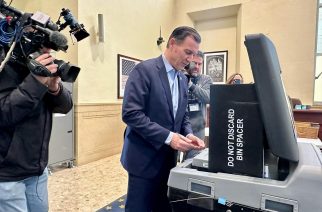
Gov. Cuomo stresses that pay raise for lawmakers and executive officers will be tied to performance and on-time budgets
It has been 20 years since lawmakers and other statewide officers received a pay raise in New York state, and they might have to wait a little while longer if the new rules are challenged in court, as some expect.
The New York State Compensation Committee, which was tasked with making pay raise recommendations, unveiled its plan Monday, proposing a $50,000 annual salary increase for state legislators and a $40,000 increase for the governor.
The members of the committee include current New York State Comptroller Thomas DiNapoli; former New York State Comptroller Carl McCall; current New York City Comptroller Scott Stringer; and former New York City Comptroller Bill Thompson.
The committee decided that state lawmakers should get a pay raise — increasing pay from $79,500 a year to $130,000 a year for most legislators. But going forward, there will be a limit on how much they are able to earn through outside income. The committee is recommending a cap of 15 percent of the lawmakers’ base earnings, which will be about $19,500 a year once the new salaries are fully phased in.
This caveat could potentially be a heavy blow to legislators who make much of their money outside their political careers, of which there are many. In fact, the governor stated during two separate radio interviews on Monday and Tuesday that he expected this rule to be challenged in court.
“Well there are conservative groups who have said they’re going to challenge it or have hinted that they’re going to challenge it,” Cuomo said on WAMC Northeast Public Radio Tuesday morning. “If they challenge the law and the law falls, it means no raise and no ban.”
Cuomo was more direct on The Brian Lehrer Show on WNYC Monday, before the committee’s report was made public.
“I’m sure there will be a challenge,” the governor said. “Republican legislators don’t want a ban on outside income because many of them have outside law firm practices. That’s a problem.”
Cuomo is suggesting that Democrats in both the Senate and Assembly pass an income ban when they return to session in January, which would remove any legal question about the authority of the Compensation Committee to do so. Democrats will control both houses when the new Legislature convenes next month.
Cuomo also clarified that pay raises would be retracted if the legislative and executive branches fail to pass an on-time budget, a job requirement stated explicitly in the state Constitution.
“They lose the raise,” Cuomo said on WAMC Tuesday. “My commissioners, the Assembly people, the Senate people — if you do not perform, you do not get a raise. And it’s not like the [Gov. George] Pataki era where we hold the money and then we give it back to you when you actually do the budget. The money is forfeited and that’s the basis upon which I supported the raise.
“I said, ‘look, people need a raise. Legislators needed a raise.’ I said that from day one, $79,000, especially if you live in New York City, is very difficult. I need a raise for the commissioners to get competent people. But the voters, the citizens have a right to expect performance. The modicum of performance is the constitutional on-time budget. You don’t pass the on-time budget on all your houses, you don’t get the raise. The executive and legislative.”
It may seem as though New York state politicians are due for a pay increase because it has been two decades since their last, and inflation and the cost of living over that time has increased dramatically. There is still, however, some controversy over the potential pay increases.
In particular, some good-government groups are not happy that legislators and other state officials will see substantial raises, especially in light of the dozens of high-profile corruption cases in state government in recent years.
Since 2000, more than three dozen officials have been outed for corruption including the former Speaker of the Assembly, Sheldon Silver, and the former Senate Majority Leader Dean Skelos.
The New York Public Interest Research Group has issued a statement opposing the Compensation Committee’s recommendations on the grounds that they don’t go far enough to eliminate Albany’s pay-to-play culture.
“The report of the State Compensation Committee does too little to reduce the risk of corruption in New York,” according to NYPIRG’s statement. “While we agree with an approach that limits outside income and slashes the number of ‘lulus’ available to legislators, much more needs to be done to respond to Albany’s ‘pay-to-play’ scandals, inadequate oversight of contracting and ethics, and weak campaign finance regulation.”
NYPIRG points out that, under the Committee’s plan, a total of 15 stipends will still be offered between the Senate and Assembly.
In the Assembly, there will be nine stipends available to the: Speaker of the Assembly at $41,500; the Majority Leader at $34,500; the Speaker Pro Tempore of the Assembly at $25,000; the Chair of the Ways and Means Committee at $34,000; the Chair of the Codes Committee at $18,000; as well as the Minority Leader at $34,500; the Minority Leader Pro Tempore at $20,500; and the Ranking Member of the Ways and Means Committee at $20,500; and the Ranking Member of the Codes Committee at $11,000.
In the Senate, there will be six stipends available for the Temporary President at $41,500; the Deputy Majority Leader at $34,000; the Chair of the Finance Committee at $34,000; as well as the Minority Leader at $34,500; the Deputy Minority Leader at $20,500, and the Ranking Member on the Senate Finance Committee at $20,500.
The Compensation Committee moved the pay raise forward on December 10, and at this point, the Assembly and Senate would have to vote against it if before January 1, 2019 if they wanted to reject it.









